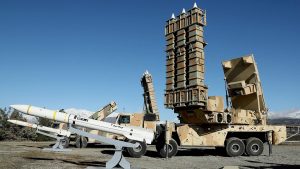If Russia’s frustration of Western military aims in Ukraine is any indication, Moscow’s military technology would make Tehran a formidable adversary against Israel during any significant outbreak of hostilities.

Iran launched a significant retaliatory strike against Israel Tuesday in an operation codenamed Operation True Promise II.
If the country’s attack in April demonstrated Tehran’s ability to penetrate Israel’s vaunted Iron Dome, Tuesday’s strike made good on its promise to follow it up with something more substantial if provoked.
Iran claimed it targeted three Israeli military bases in an attack that reportedly struck multiple F-35 fighter jets.
The US-provided aircraft would’ve been used to target Hezbollah leader Hassan Nasrallah last week and would constitute an important part of Israel’s military force if it follows through on a threatened invasion of Lebanon.
Multiple analysts joined Sputnik to comment on the event Tuesday, noting that Tehran has demonstrated substantial military power after practicing restraint for an extended period.
“Are people mistaking restraint with weakness?” asked The Critical Hour host Wilmer Leon, adding, “it seems as though there’s a very disciplined tactic here of measured response.”
“It does seem so,” claimed journalist Robert Fantina, the author of Settler Colonialism in Palestine and Kashmir. “It does seem that if people are going to mistake that measured response for weakness, they’re going to regret it because they’re going to be proven wrong.
“Iran does not want to be attacked by the United States, obviously,” the commentator noted. “And any attack against Israel – even retaliatory, even in self-defense – would bring the United States into the war, unless the response is very measured, very well planned, and not a kind of random carpet-bombing sort of thing. Not the sort of thing that Israel is doing to Lebanon and Gaza.”
 Demonstrators cheer as artificial snow sprayed in an anti-Israeli gathering celebrating Iran’s missile strike against Israel, at Felestin (Palestine) Sq. in Tehran, Iran, Tuesday, Oct. 1, 2024 – Sputnik International, 1920, 02.10.2024
Demonstrators cheer as artificial snow sprayed in an anti-Israeli gathering celebrating Iran’s missile strike against Israel, at Felestin (Palestine) Sq. in Tehran, Iran, Tuesday, Oct. 1, 2024 – Sputnik International, 1920, 02.10.2024
Iran Responds to Assassinations With Missile Strikes as Israel Seeks to Expand Conflict
“So, I think that the government of Iran is waiting and watching, and it’s playing the long game. It’s not necessarily looking for an immediate victory, but it does want to see progress in peace in the region, and that means the defeat of Israel. How it will do that remains to be seen.”
Author and independent journalist Esther Iverem agreed with the assessment, noting that many observers predicted “this attack would be much larger.”
“That previous attack was just almost like a showpiece to let Israel know that, ‘not only can we hit you, but we can hit you hard. Our missiles can get through your many layers of defense even with all of your protectors in NATO and in the US, basically shooting down most of those key projectiles for you; our main missiles hit their targets and hit them precisely and hard,’” said the radio host, summarizing Tehran’s perspective.
Russia and Iran have enjoyed warm diplomatic relations for decades, forming an important part of an emergent counterhegemonic bloc against Western influence. The cooperation has extended to the military realm, with Tehran reportedly possessing Russian hypersonic missile technology.
Hypersonic missiles are able to change course in air and travel at speeds of tens of thousands of miles per hour, frustrating traditional interception technology.
Iran said it deployed its hypersonic Fatteh-2 missile during Tuesday’s attack, which is able to maneuver at a speed of about 10,000 miles per hour (over 16,000 kilometers per hour).
Western countries are currently unable to match Russia’s hypersonic technology, while analysts claim the United States would also struggle to frequently replenish Israel’s Iron Dome during a prolonged conflict.
 Israeli Iron Dome air defense system launches to intercept missiles fired from Iran, in central Israel, Sunday, April 14, 2024. – Sputnik International, 1920, 01.10.2024
Israeli Iron Dome air defense system launches to intercept missiles fired from Iran, in central Israel, Sunday, April 14, 2024. – Sputnik International, 1920, 01.10.2024
What is Known About Iran’s Missile Attack on Israel?
11 hours ago
“We know that the Russian Security Council has also met twice in the last week,” noted international relations and security analyst Mark Sleboda, commenting on speculation of increased Russian and Iranian military cooperation in recent weeks and months.
“We know that the Russian Defense Minister Sergei Shoigu has been shuttling back and forth to Iran multiple times in the past few weeks and even the normally quiet – I would say technocratic – Russian Prime Minister Mikhail Mishustin due to be in Tehran.”
“There were a lot of stories in the Western media how Russia was hurrying military flights carrying, supposedly, air defense systems and electronic warfare and this would be used to build up Iranian defenses in case of an Israeli-US counterattack,” he added.
If Russia’s frustration of Western military aims in Ukraine is any indication, Moscow’s military technology would make Tehran a formidable adversary against Israel during any significant outbreak of hostilities.
 Russian Prime Minister Mikhail Mishustin and Iranian First Vice President of Iran Mohammad Reza Aref – Sputnik International, 1920, 30.09.2024
Russian Prime Minister Mikhail Mishustin and Iranian First Vice President of Iran Mohammad Reza Aref – Sputnik International, 1920, 30.09.2024
Iran Vice President Calls Cooperation With Russia One of Foreign Policy Priorities
By John Miles
Published by Sputnik Globe
Republished by The 21st Century
The views expressed in this article are solely those of the author and do not necessarily reflect the opinions of 21cir.com
